 |
Identifying Individual Birds: | Communicating with Wild Birds: | Bird Intelligence & Relationships | Other Hearts |
 |
|
| Communicating - Articles | Not Just A Bird.... | Meeting Maggie | Flying Foxes & Bats | |||
| Rescuing Birds | No Life for Caged Birds | |||||
| Feathery Tales | Your Winged Friends | The Sticky Beak - Slideshows | Books | |||
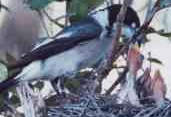

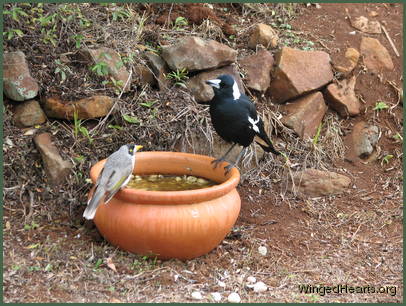
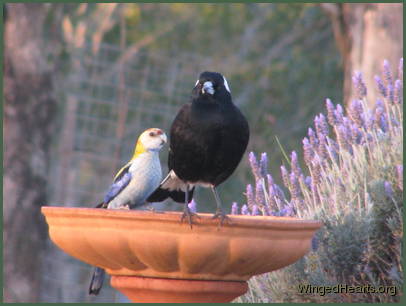 Different species of birds have different needs regarding access to water and plants. The extent and diversity of their territories and feeding habits influence their visiting times. But even more interestingly the ability to negotiate their visiting and access rights with other birds who are considered by them as the rightful owners of the territory has a major impact on their movements.
Different species of birds have different needs regarding access to water and plants. The extent and diversity of their territories and feeding habits influence their visiting times. But even more interestingly the ability to negotiate their visiting and access rights with other birds who are considered by them as the rightful owners of the territory has a major impact on their movements.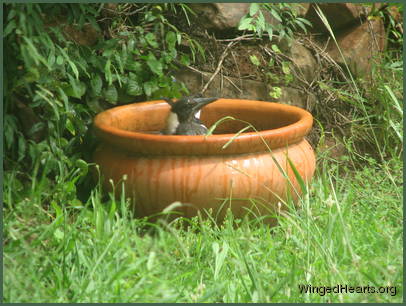 After the tragic loss of three gorgeous chicks (and possibly more) Maggie and Vicky were happy to be blessed with Monty and Mindy from Vicky's second clutch in 2007. Sophie loved the pair dearly, they help her heal from her loss. Wendy was happy to have two younger playmates - but was a bit overwhelmed by them at times.
After the tragic loss of three gorgeous chicks (and possibly more) Maggie and Vicky were happy to be blessed with Monty and Mindy from Vicky's second clutch in 2007. Sophie loved the pair dearly, they help her heal from her loss. Wendy was happy to have two younger playmates - but was a bit overwhelmed by them at times. 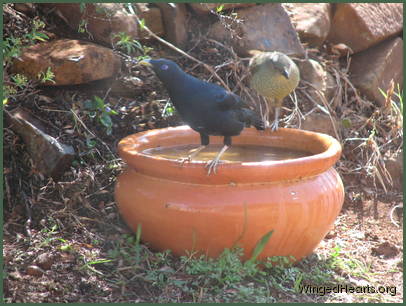 Communicating successfully with someone from a different species, who is not only not dependent on you, but also flies off in a flash if they don't like the sound of your voice, brings its own suite of challenges. In this series, we look at each of the five major aspects of communicating with wild birds. These involve making them familiar with our speech patterns, listening to learn, understanding our bird's response, building trust, and allowing the friendship to develop. In the previous issue we covered the importance of making the wild birds feel comfortable in your presence, showing them that you care about their welfare and wish to make friends.
Communicating successfully with someone from a different species, who is not only not dependent on you, but also flies off in a flash if they don't like the sound of your voice, brings its own suite of challenges. In this series, we look at each of the five major aspects of communicating with wild birds. These involve making them familiar with our speech patterns, listening to learn, understanding our bird's response, building trust, and allowing the friendship to develop. In the previous issue we covered the importance of making the wild birds feel comfortable in your presence, showing them that you care about their welfare and wish to make friends. 




